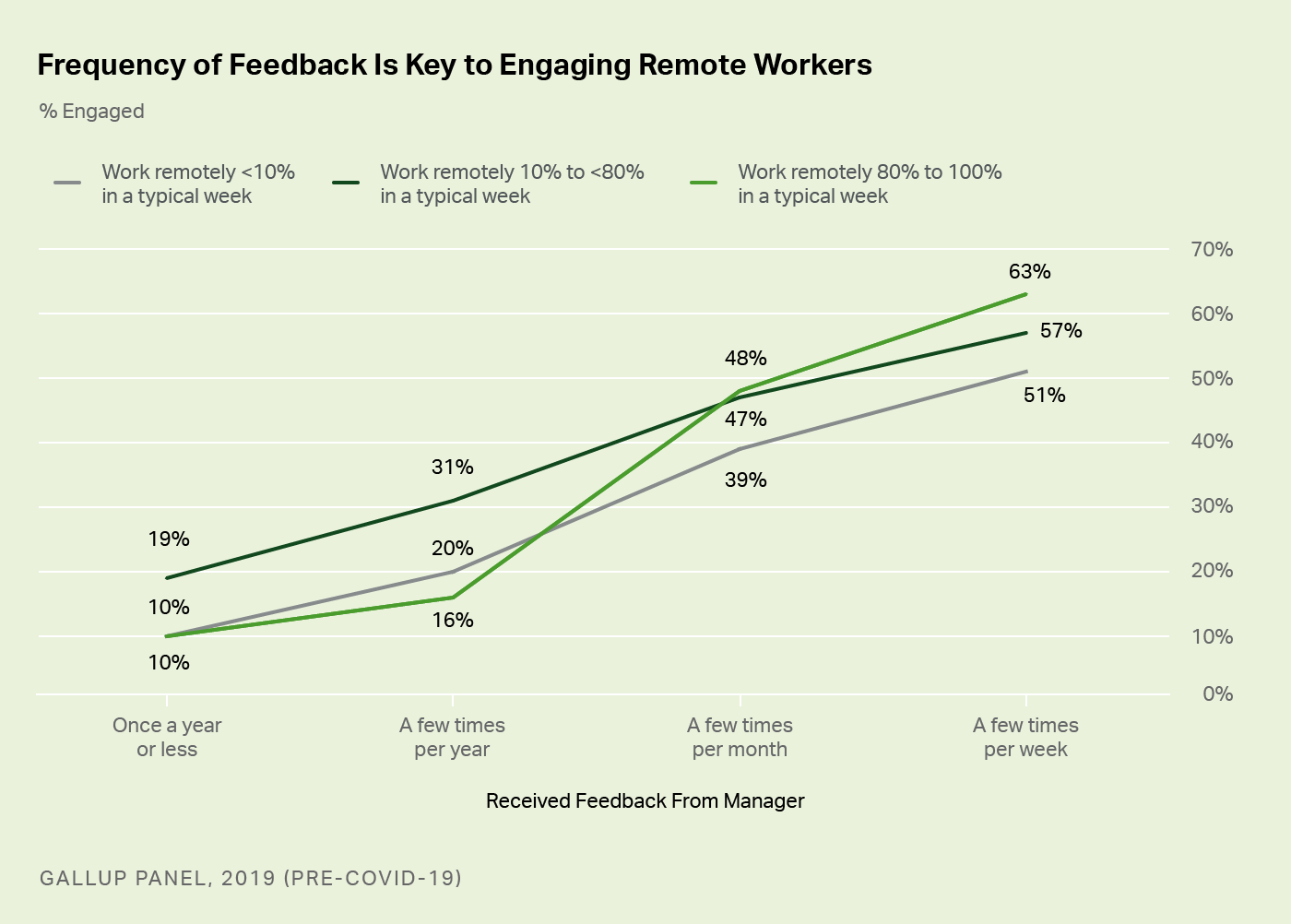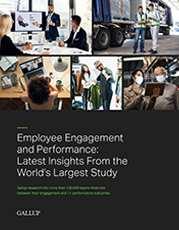2020 will likely be remembered as the year the workplace changed forever. From in-office safety measures to work-from-home conference calls, leaders have been forced to reimagine every aspect of their management culture.
What's essential to performance? How does personal life shape professional life? What do our core values really mean when the marketplace throws a curveball?
As leaders navigated 2020's tough questions, many made transformative discoveries and tapped into new performance potential. After 12 months of challenges, leaders can walk away with decades' worth of invaluable workplace lessons.
Here are seven of Gallup's top workplace insights from this year:
1. Remote workers can have higher engagement than in-office workers -- when they receive frequent feedback from their manager.
Although remote work has been on the rise for some time, many workers found themselves working from home for the first time. Leaders have wanted to know how effective remote work can really be. Although job roles and responsibilities can make a difference, Gallup has found that remote workers can be highly engaged with their work. One key is frequent manager communication and feedback.

A line chart showing that the more frequent feedback an employee gets, the more engaged they are. This is especially true of those who work remotely. 63 percent of those who work remotely 10 percent to 80 percent of the time and who receive feedback once a week or less are engaged.
2. Employee engagement is an even stronger predictor of performance during tough economic times.
Employee engagement is a consistent predictor of many organizational outcomes -- including customer loyalty, profitability and sales. A more recent Gallup study found that engagement was an even stronger predictor of organizational performance during recessions than in non-recession times.
3. Management has a stronger influence on burnout than hours worked.
Prior to 2020, 76% of employees said they experienced burnout at least sometimes at work. Since the pandemic, many employees have seen a rise in burnout risk. But Gallup research reveals that it's not just about working long hours. When employees are inspired, motivated, and supported in their work, they naturally do more work -- and that work is significantly less stressful.
After 12 months of challenges, leaders can walk away with decades' worth of invaluable workplace lessons.
4. Most performance management systems are too slow and rigid to handle an uncertain, ever-changing marketplace.
Prior to COVID-19, traditional performance management was plagued with infrequent, irregular feedback and goal setting that became irrelevant before the next annual review came around. The pandemic ended up exposing the flaws in this system. Going forward, managers need to be trained to have frequent, timely and informal performance conversations with quarterly progress reviews so that expectations can change as often as your business does.
5. Although leaders may fear being micromanagers, most employees receive far too little feedback -- and even those who receive negative feedback would prefer to get more.
Forty-seven percent of employees report receiving feedback from their manager "a few times a year" or less. And 19% say they receive feedback once a year or less! Employees who experience "fly-in and fly-out" managers are often stressed because they don't have clear expectations, support, coaching or meaningful feedback. Nobody wants to be micromanaged, but everyone needs a supportive coach.
6. If your employees don't know what makes your brand unique, your customers won't either.
In the restaurant industry, 40% of employees strongly agree that they know what makes their organization different from competitors -- and only 35% are extremely proud of the quality of products their restaurant offers. If your employees think your company is generic, how can you offer a compelling brand experience to your customers?
7. Workplace burnout is reduced to near zero among engaged employees with high wellbeing who also work in a culture that honors individual strengths.
If leaders have learned anything in 2020, it is that employee wellbeing is an essential factor in business survival. If your people aren't healthy -- physically and mentally -- you won't succeed. Gallup has found that employee wellbeing and engagement are highly reciprocal (influencing each other) and additive (boosting each other). When employers support wellbeing, they support their employees' engagement, performance, and productivity as well.
Are your employees experiencing burnout right now? Do you know if they're engaged in their work? Are your managers micromanaging, or are they leading motivating coaching conversations?
Get answers to these questions -- and give your management team full access to Gallup's management insights -- through a subscription to Gallup's survey and learning platform -- Gallup Access.




